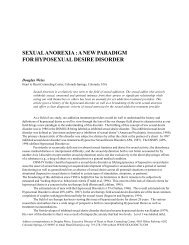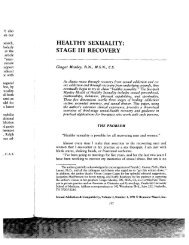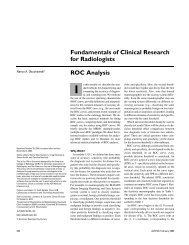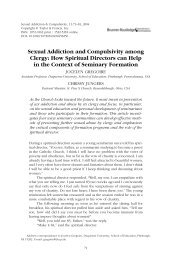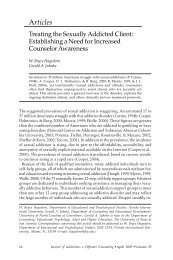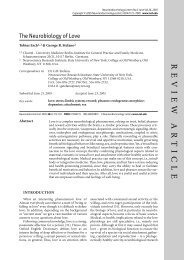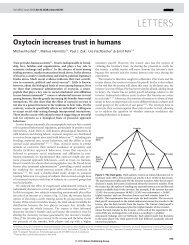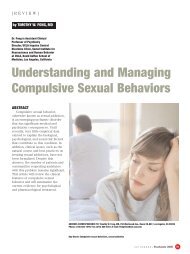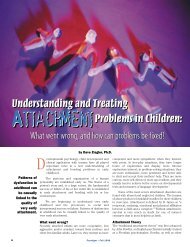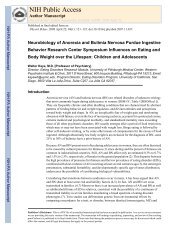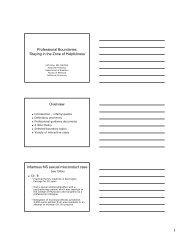Buddhist Notions of Akrasia
Buddhist Notions of Akrasia
Buddhist Notions of Akrasia
Create successful ePaper yourself
Turn your PDF publications into a flip-book with our unique Google optimized e-Paper software.
<strong>Buddhist</strong> <strong>Notions</strong> <strong>of</strong> <strong>Akrasia</strong><br />
Ryan Harbert<br />
The philosophical notion <strong>of</strong> akrasia, incontinence, or weakness <strong>of</strong><br />
will, has, in the West, been around at least since the time <strong>of</strong> Socrates.<br />
The Greek word “akrasia” was apparently first used by Aristotle in<br />
his Nicomachean Ethics. In the East, in Buddhism, the word “akrasia”<br />
<strong>of</strong> course didn’t exist, but the same notion does seem to have been a<br />
part <strong>of</strong> <strong>Buddhist</strong> tradition. In this paper I will attempt to articulate<br />
various formulations <strong>of</strong> what <strong>Buddhist</strong> akrasia might look like, and I<br />
will relate them to the Platonic and Aristotelian articulations already<br />
found in the West.<br />
I want to begin by briefly outlining the notions <strong>of</strong> akrasia that we<br />
get from Plato’s Socrates (or early Plato), later Plato, and Aristotle.<br />
These seem to be the most studied understandings <strong>of</strong> akrasia in the<br />
West. 1 Laying them out now will also provide categories for later<br />
comparison and analysis <strong>of</strong> <strong>Buddhist</strong> notions <strong>of</strong> akrasia.<br />
Before we begin, I want to clarify, with respect to the topic, what<br />
exactly I am addressing. I am not merely arguing that a notion <strong>of</strong><br />
akrasia exists within Buddhism. My main goal is to attempt to<br />
understand and explain what some writers within Buddhism have<br />
said that might be interpreted as a <strong>Buddhist</strong> formulation <strong>of</strong> akrasia.<br />
In doing this, I believe that I will have effectively shown that a<br />
notion <strong>of</strong> akrasia does in fact exist within Buddhism. Also, in this<br />
paper I will use the terms “akrasia,” “incontinence” and “weakness <strong>of</strong><br />
will” interchangeably. And I use the term “weakness <strong>of</strong> will”<br />
knowing that the ancient Greeks and <strong>Buddhist</strong>s seemingly did not<br />
have a notion <strong>of</strong> the will as we do.<br />
Part I – The Platonic and Aristotelian <strong>Notions</strong><br />
The major notions and analyses <strong>of</strong> akrasia that have been<br />
understood by commentators in the West have been articulated by<br />
Plato and Aristotle. Plato understood it in apparently two different<br />
ways--one articulated in the Protagoras and one in the Republic.<br />
Plato’s early account <strong>of</strong> akrasia also shows up in the Meno, but the<br />
1<br />
Donald Davidson also has a well known and much written about modern recasting <strong>of</strong> the<br />
problem. His account should be considered in a fuller treatment <strong>of</strong> this topic.<br />
In M.P. Wolf and L. Musselman (eds.) Voicing Ideas, vol 3, pp. 65-71. Fresno, CA:<br />
California State University, Fresno.
66 Ryan Harbert<br />
Protagoras, however, will suffice for this discussion. Aristotle spent<br />
his effort working through the issue in the in the Nicomachean Ethics.<br />
Plato, Aristotle and, as we will see, some <strong>Buddhist</strong> writers, all<br />
essentially saw weakness <strong>of</strong> will as a phenomenon to be explained.<br />
They all seemingly agree that there are apparently times when a<br />
person will know the good or right, but will choose the evil or bad.<br />
There are various ways to formulate this apparent incoherence, but<br />
for the purpose <strong>of</strong> this paper, they all essentially boil down to the<br />
above.<br />
Plato, in the Protagoras, represents his teacher, Socrates, as<br />
wanting to deny the conventionally held account (i.e., the account<br />
believed by most people) <strong>of</strong> how one acts against one’s own better<br />
judgment (i.e., acting akratically). In his discussion with Protagoras,<br />
Socrates represents the conventional account by explaining that<br />
knowledge <strong>of</strong> the right action is overpowered by something else:<br />
...when knowledge is present in a human being, they think that it is<br />
not the knowledge that rules him but something else — now<br />
spirited anger, now pleasure, now pain, sometimes erotic love,<br />
many times fear. They simply think about knowledge as they do a<br />
slave, that it is dragged around by all else... (Plato 1998, 352b-c)<br />
Socrates ultimately argues that it is not that knowledge is being<br />
“dragged around” as a slave, but that knowledge is lacking.<br />
Socrates, in his account, seems to equate pleasure with the good and<br />
pain with the bad (or evil). Those who go awry simply don’t have<br />
the knowledge to measure goods and bads properly. After some<br />
discussion on measuring properly in order to make a decision about<br />
the right action, Socrates says “...those who err in choosing pleasures<br />
and pains...do so through a lack <strong>of</strong> knowledge; and not only <strong>of</strong><br />
knowledge but <strong>of</strong> that knowledge which...is the art <strong>of</strong> measuring”<br />
(Plato 1998, 357d).<br />
Plato, later in his career, seems to have moved to a position where<br />
right-doing was not solely the result <strong>of</strong> knowledge (or wrongdoing<br />
the result <strong>of</strong> ignorance). At various places in the Laws, generally<br />
considered one <strong>of</strong> Plato’s later dialogues, Plato, unlike Socrates in the<br />
earlier Protagoras, indicates that knowledge can, in fact, be dragged<br />
around by the passions (Plato 2007, 698b; 863e-864a). And thus, Plato<br />
suggests that, contrary to what Socrates was teaching earlier, it is<br />
possible for a person to knowingly choose the bad. What accounts<br />
for such a change in Plato’s conception <strong>of</strong> weakness <strong>of</strong> will is,<br />
apparently, Plato’s later reflections on the nature and makeup <strong>of</strong> the<br />
human soul. In the Republic 436a-b Plato gives us his well-known<br />
three divisions <strong>of</strong> the soul: the calculating part, or reason, the<br />
spirited part, and the passionate part. All three <strong>of</strong> these are said to<br />
have their own ends and essentially be at odds with one another
<strong>Buddhist</strong> <strong>Notions</strong> <strong>of</strong> <strong>Akrasia</strong> 67<br />
over the rule <strong>of</strong> the whole soul (or person). Of course, they are only<br />
at odds in the disordered soul; they work well together in the wellordered<br />
soul. With this account <strong>of</strong> the soul, akratic behaving occurs<br />
when the passionate or spirited parts somehow overpower the<br />
calculating part. And so, we find that mere knowledge <strong>of</strong> the right,<br />
existing in the reasoning part, is not enough to guarantee that it<br />
obtains.<br />
Finally, in considering Aristotle’s view on akrasia we come back to<br />
a position close to that <strong>of</strong> Socrates--that weakness <strong>of</strong> will is due to a<br />
lack <strong>of</strong> knowledge. Aristotle’s articulation <strong>of</strong> incontinence is more<br />
extensive and nuanced than Plato’s Socrates. Generally speaking,<br />
Aristotle’s position is that incontinent people “both have knowledge<br />
in a way and do not have it” (Aristotle 1999, 1147a14). That is,<br />
knowledge <strong>of</strong> the good or right exists within the incontinent person,<br />
but somehow it is not active when the incontinent act is performed.<br />
Aristotle and Socrates both agree that incontinent acting does not<br />
really happen—it is only an appearance. And both agree that where<br />
there are incontinent acts, there is ignorance, or lack <strong>of</strong> knowledge.<br />
Part II – The <strong>Buddhist</strong> <strong>Notions</strong><br />
Tom J.F. Tillemans, in his article, “Reason, Irrationality and<br />
<strong>Akrasia</strong> (Weakness <strong>of</strong> the Will) in Buddhism,” 2 comes to the<br />
conclusion that <strong>Buddhist</strong>s do, in fact, hold a notion <strong>of</strong> akrasia. He<br />
states that:<br />
...there is a recurrent argumentation in texts like Arydeva’s<br />
Catuhsataka, in Nagarjuna’s Ratnavali and in the Bodhicaryavatara <strong>of</strong><br />
Santideva to the effect that <strong>Buddhist</strong> practitioners know well that<br />
most <strong>of</strong> their actions are worse courses. Arydeva (2nd-3 rd century<br />
CE) for example, consecrates his first four chapters to a famous<br />
series <strong>of</strong> four “illusions” (viparyasa) that are supposedly present in<br />
varying degrees in the troubled minds <strong>of</strong> <strong>Buddhist</strong> practitioners:<br />
thus <strong>Buddhist</strong>s are convinced that things are impermanent, but also<br />
tenaciously and wrongly hold them to be permanent, what is<br />
actually painful is held to be pleasant, unclean things are held to be<br />
clean, and selfless things are held to have selves. (forthcoming, p. 5)<br />
Tillemans explains that there are many examples <strong>of</strong> “odd<br />
behaviour and incoherence” from Santideva, Dharmapala and the<br />
2 Tom Tillemans is the Chair <strong>of</strong> <strong>Buddhist</strong> Studies at the University <strong>of</strong> Lausanne in<br />
Switzerland. He has graciously allowed me to use this unpublished article for my essay. I<br />
am relying heavily on it as a representation <strong>of</strong> <strong>Buddhist</strong> thinking about akrasia as it seems<br />
that there have been very few commentators relating East and West on this subject. I will<br />
provide this article upon request.
68 Ryan Harbert<br />
<strong>Buddhist</strong> monastic writers (forthcoming, p. 6). 3 Tillemans, in his<br />
article, then turns toward the topic <strong>of</strong> how <strong>Buddhist</strong> writers,<br />
themselves accepting that wrong behavior is happening despite<br />
what is known to be right, account for such a problem. He provides<br />
three different accounts.<br />
The first is to give an Abhidharma-based psychological account <strong>of</strong><br />
how the passions constrain one to move against one’s own better<br />
judgment. While Tillemans doesn’t get into the exact nature <strong>of</strong> such<br />
an account, it appears that it is similar to a Western materialistpsychological<br />
account where behavior is explained in a way that<br />
precludes freedom <strong>of</strong> choice for an autonomous agent. He says that<br />
such an account would explain that the internal forces moving a<br />
person toward evil “might be as irresistible and intrusive as<br />
overwhelming external force” (forthcoming, p. 7). He believes that<br />
this account is inadequate because, although such an account may<br />
explain the extreme cases <strong>of</strong> “crimes <strong>of</strong> passion, obsessivecompulsions,<br />
or demon possession,” such an account does not<br />
explain cases where a person does seem to have a choice not to<br />
comply with their inner drives. That said, and without further<br />
development, he moves on to the second account.<br />
The second way, according to Tillemans, a <strong>Buddhist</strong> might<br />
construct an account <strong>of</strong> how wrong behavior happens is to follow<br />
the thinking in Dharmakirti’s Pramanavarttika:<br />
What then is the source <strong>of</strong> these [moral] faults so that they are<br />
abandoned due to the repeated cultivation <strong>of</strong> its antidote? The<br />
genesis <strong>of</strong> all the [different] kinds <strong>of</strong> faults is due to the false view<br />
that reifies the person (satkayadarsana). This constitutes ignorance<br />
(avidya); the attachment to the [I and the mine] is based on that.<br />
From that [attachment] come hatred and [all] the rest [<strong>of</strong> the moral<br />
faults]. (forthcoming, p. 8)<br />
As Dharmakirti continues to explain “if someone sees that there<br />
is no I and no mine,” (forthcoming, p. 8) such a person will not be<br />
attached to anything and will not be given to hatred or moral faults.<br />
And, as he explains above, the false view that is “reifying the self” is<br />
“precisely that [view] that we term ‘ignorance’ (ajnana)”<br />
(forthcoming, p. 8) This view comes tantalizingly close to the views<br />
<strong>of</strong> Socrates and Aristotle. I will have more to say about this below.<br />
The final account <strong>of</strong> how a person chooses to act against his own<br />
will that Tillemans’s articulates is that there are competing networks<br />
<strong>of</strong> belief existing in the mind or psyche <strong>of</strong> the akratic <strong>Buddhist</strong>.<br />
Although he doesn’t provide any quotes, he believes that this is the<br />
most plausible rendering <strong>of</strong> <strong>Buddhist</strong> texts such as Pramanavarttika<br />
3<br />
He uses “incoherence” to describe the reasoning behind an akratic act.
<strong>Buddhist</strong> <strong>Notions</strong> <strong>of</strong> <strong>Akrasia</strong> 69<br />
and others. <strong>Buddhist</strong> literature, he argues, regularly indicates that<br />
we create networks <strong>of</strong> beliefs or reasonings, such as “this is me,”<br />
“this is mine,” “this is essential to my happiness” (forthcoming,<br />
p. 11) These reasonings cohere with one another very well and lead<br />
to decisions to act in certain ways. This network <strong>of</strong> beliefs then<br />
competes with another network <strong>of</strong> <strong>Buddhist</strong> beliefs that states that<br />
there is no I and thus no need to defend it. The <strong>Buddhist</strong>, Tillemans<br />
explains, according to these texts, is caught between these two<br />
networks.<br />
Part III - Analysis<br />
In contrasting the Abhidharma-based view <strong>of</strong> incontinence with<br />
Plato’s and Aristotle’s views, we don’t find much commonality.<br />
Given that, as Tillemans explains, the Abhidharma-based view is a<br />
seemingly materialist account <strong>of</strong> psychological behavior, it appears<br />
to be a completely different kind <strong>of</strong> account than what Plato and<br />
Aristotle give us. The Abhidharma-based account needs further<br />
development and exploration in order that points <strong>of</strong> contact with<br />
Plato and Aristotle might be determined – it was not, however,<br />
within the scope <strong>of</strong> Tillemans’s paper (not this paper).<br />
In contrasting Plato and Aristotle with the second, Dharmakirti’s<br />
Pramanavarttika-based notion <strong>of</strong> <strong>Buddhist</strong> akrasia above, at first<br />
glance it seems that the account is in line with Socrates and<br />
Aristotle’s account <strong>of</strong> ignorance <strong>of</strong> the good leading to bad behavior.<br />
But a difference can be found in that Dharmakirti and other major<br />
<strong>Buddhist</strong> thinkers saw ignorance not as a lack <strong>of</strong> knowledge, but as a<br />
misunderstanding, or a “false view.” 4 The difference between<br />
“ignorance” and “false view” here is not clear. Operating under a<br />
false view leads to the notions that things are “permanent,” that<br />
what is actually painful is pleasant, and that “selfless things” are<br />
selves. It is not obvious how this might map to Plato’s and Aristotle’s<br />
notion <strong>of</strong> ignorance. Exploring possible interpretations <strong>of</strong> the “false<br />
view” idea, it might be held to fall more in line with the Platonic and<br />
Aristotelian idea that a person simply may not know what the good<br />
is—such a view precludes incontinent behavior since incontinent<br />
people, by definition, know that what they are doing is wrong. But<br />
this doesn’t seem to fit Tillemans’s representation that <strong>Buddhist</strong>s<br />
seem to knowingly engage in wrong behavior.<br />
Alternatively, the “false view” idea could be more in line with<br />
Aristotle’s idea that knowledge could be inactive in the person who<br />
is “asleep, mad or drunk.” At the time <strong>of</strong> acting (excluding the<br />
person asleep), such a person has the proper knowledge available to<br />
4<br />
Tillemans points out this problem.
70 Ryan Harbert<br />
them (as <strong>Buddhist</strong>s with a false view do), but for whatever reason, it<br />
is just not acted on. This seems a better fit with the “false view”<br />
notion. But to come to a comfortable conclusion an account would<br />
need to be given <strong>of</strong> what it exactly means and how exactly<br />
knowledge (or the good view) could be inactive.<br />
The final “competing networks” view <strong>of</strong> <strong>Buddhist</strong> akrasia that<br />
Tillemans articulates could seem, at first glance, to comport well<br />
with Plato’s later, modified, acceptance <strong>of</strong> akrasia. The <strong>Buddhist</strong><br />
networks could be seen as roughly equivalent to Plato’s division <strong>of</strong><br />
the soul. But, here too, there are differences: Plato divides the soul<br />
into separate faculties (reason, spirit, and appetite) which either<br />
compete or cooperate depending on how well-ordered the soul is.<br />
According to the “competing networks” view, there is a false<br />
network in which the world and conventional reality is seen as<br />
permanent and independent. This network is a false one. It cannot, if<br />
we were to follow Plato’s pattern, be well-ordered with the good<br />
network (where the world is understood as impermanent), as if it<br />
were a faculty <strong>of</strong> the soul. Rather than faculties, the “networks” seem<br />
akin to world views.<br />
In general, Tillemans’s paper is very helpful as a brief<br />
introduction to the subject <strong>of</strong> <strong>Buddhist</strong> akrasia. But I believe for those<br />
<strong>of</strong> us sitting in the western tradition who are familiar with the longlived<br />
Platonic and Aristotelian concepts <strong>of</strong> weakness <strong>of</strong> will, it<br />
should be expanded in a such a way that the ideas <strong>of</strong> the various<br />
important <strong>Buddhist</strong> thinkers are more accurately and thoroughly<br />
translated into Western categories. An important area that I think he<br />
could have touched on is that Plato and Aristotle spend much time<br />
dealing with the passions. Tillemans barely mentions the passions in<br />
his account. It is my guess that the <strong>Buddhist</strong> notion <strong>of</strong> craving might<br />
map quite well as the equivalent <strong>of</strong> the passions, and how a<br />
<strong>Buddhist</strong> would tell the story <strong>of</strong> how the passions, or craving, is<br />
involved in incontinence should be compared to how Plato and<br />
Aristotle explain the role <strong>of</strong> the passions. Nevertheless, it is difficult<br />
to see how a <strong>Buddhist</strong> account would fit with Platonic and<br />
Aristotelian systems <strong>of</strong> the human psyche – They all seem very<br />
different in their own way. In fairness, it should be remembered that<br />
such a detailed analysis was beyond Tillemans’s scope, given that his<br />
paper was a rather broad survey (as is mine) <strong>of</strong> the issue <strong>of</strong> <strong>Buddhist</strong><br />
akrasia.<br />
In conclusion, Tillemans’s paper was quite broad and didn’t<br />
provide much fodder for in-depth analysis. For this reason, my<br />
analysis <strong>of</strong> these issues is also broad and preliminary. Nevertheless,<br />
in this paper I have attempted to articulate various formulations <strong>of</strong><br />
<strong>Buddhist</strong> akrasia. I have also attempted to relate them to Platonic and
<strong>Buddhist</strong> <strong>Notions</strong> <strong>of</strong> <strong>Akrasia</strong> 71<br />
Aristotelian articulations <strong>of</strong> akrasia already found in the West. My<br />
account <strong>of</strong> the various notions <strong>of</strong> <strong>Buddhist</strong> akrasia was heavily<br />
dependent on Tom Tillemans’ article, “Reason, Irrationality and<br />
<strong>Akrasia</strong> (Weakness <strong>of</strong> the Will) in Buddhism.” I am very grateful to<br />
him for allowing me to use it.<br />
REFERENCES<br />
Aristotle. (1999). Nicomachean Ethics. Indianapolis, IN: Hackett Pub. Co.<br />
Plato. (1998). Protagoras. In The Dialogues <strong>of</strong> Plato, vol. 3: Ion, Hippias Minor, Laches,<br />
Protagoras. New Haven, CT: Yale University Press.<br />
Plato. (2007). Laws. New York: NuVision Publications.<br />
Tillemans, T. (forthcoming). “Reason, Irrationality and <strong>Akrasia</strong> (Weakness <strong>of</strong> the Will)<br />
in Buddhism.” University <strong>of</strong> Lausanne, Switzerland.



